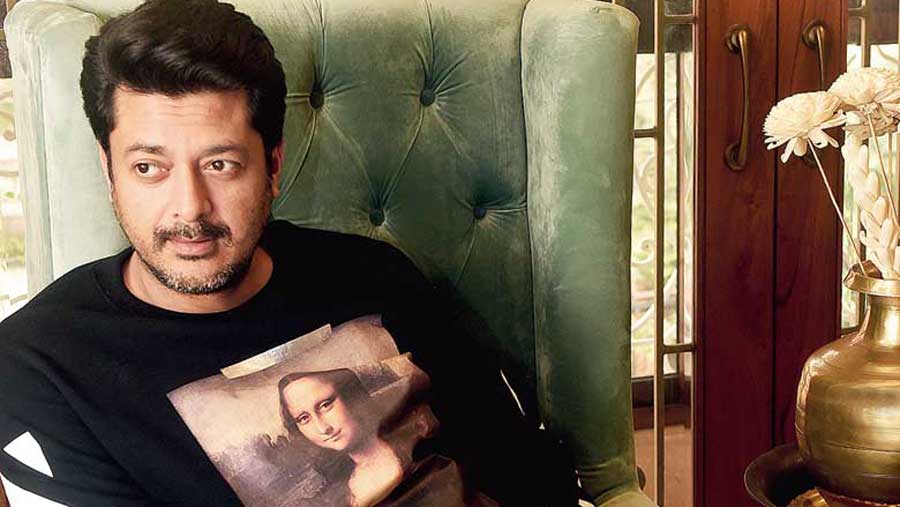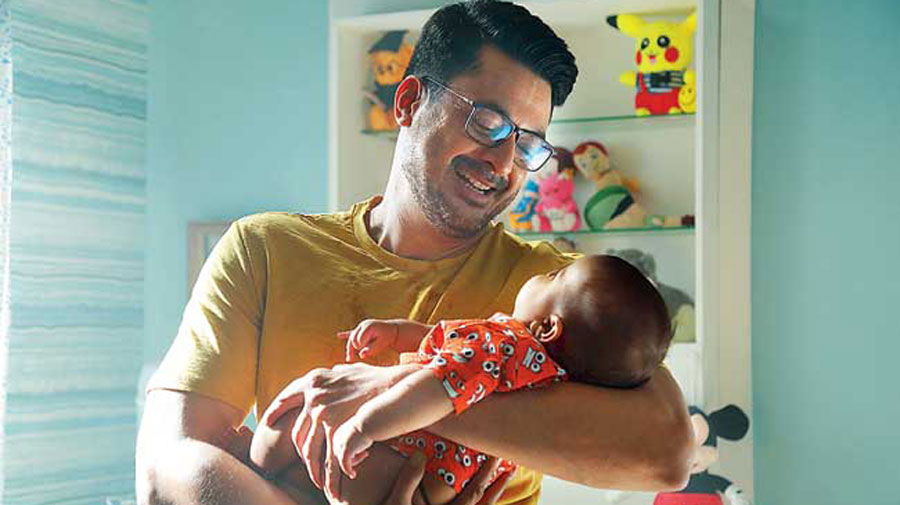In the film Baba, Baby O..., Jisshu Sengupta plays Megh Roddur Chattopadhyay, who becomes a father of twin boys through surrogacy. Megh’s father, a retired railway officer, and his mother, a homemaker, welcome the decision, but have their own sets of fears. In their neighbourhood, not everyone is aware of surrogacy and people start speculating about Megh Roddur’s love life and what made him become a single father. Megh meets Brishti Roy, owner of a toy shop, and falls in love. As luck would have it, Brishti (Solanki Roy), who seems to be managing a toy shop on her own, isn’t too fond of kids! A The Telegraph chat with Jisshu...
You are always on the move, constantly shooting in three different film industries — Telugu, Bengali and Hindi. How do you see this phase of your life?
You need to balance it out. With age, I have grown. I have become more confident. My essence is the same. I’m enjoying this phase of my life. But I also know that after 10 years maybe, this state of being so busy may not be the same. I will of course push myself till I can. I want to do as much good work as possible now.
I’ll be completing 24 years in the Bengali film industry whereas it is only three years (in Telugu). In Hyderabad, people know me... in hotel lobbies I’m giving selfies and autographs as I’m walking in or stepping out. There they celebrate, respect and embrace you as an actor. That’s a big thing there and they are really open and genuine about it. And if someone is doing good work, they really encourage it.
Why did you say yes to Baba, Baby O...?
Because it is produced by Windows. The story is brilliant. It is a romantic comedy but we say a lot of serious things through the story. The major theme is surrogacy, and it has been nicely explained in the film. That’s a major part of the film. The story is also about a single father and how he falls in love with a girl younger to him after the babies come into his life. It is a beautiful love story and it has the charm of Bengali films from the golden era. There is a nice sense of humour.
Did it feel like homecoming?
I have known Shibu (Shiboprosad Mukherjee) for two decades now. I have seen his process, he has seen my journey. We have been very good friends for years now. Aritra (Mukherjee, director of Baba, Baby O...) was the chief assistant director during Posto, and he is very clear... and he is very open-minded. I like that about him. There was an exchange of ideas and the flow of communication was very smooth. As an actor, you want to give more then, and Aritra gave me that space. I thank him for that. Solanki is so focused. She has already proved herself in television. I’m sure she’ll do well in films.
The film also deals with a love story between characters where there is an age gap...
It’s an interesting take. There could have been a separate film on it. The films made by Windows have always given out socially relevant messages that hit home and touched people’s lives. People identify with it. That is the beauty of this film. It is so relevant to the changes in today’s society.
How was your experience shooting with the two babies?
I loved it. It was almost like shooting a documentary, there was always that element of surprise, one never knew what they will do during that moment.
We were always ready, whenever they were in the moment, we would capture that. There was a separate space for them. We took very good care of them. We were really protective. No one would go near them, apart from me. We were extra careful always. Family members of the babies were present. We maintained all protocols very thoroughly since we were shooting with babies. The babies had a great time on set and so did we. This film has a lot of references to films from 1990s. That is another beautiful part of this film.

Tell us about your character...
My character is shy, isn’t forthright about expressing himself too much. He doesn’t always show his emotions. I felt very light after doing this film. This happened to me after a long time. I am confident that people will really like this film.
In future, will you be working simultaneously in all three industries?
It depends on the content and how my character is impacting the story of the film. Also, how crucial my character is to the story. My parameters remain the same, it can even be one scene. But it’ll be the scene. For example, I didn’t have a huge role in Criminal Justice 2 but you will talk about me till the last episode. And then you’ll hate my character. After I started working with Rituparno Ghosh, it has always been about the character. I get a lot of offers for OTT but I want to pick and choose. Probably I’ll do two-three Bengali films this year.
How would you compare the working styles of the Telugu and Bengali film industries?
The way Bengali films create a canvas within a limited budget in a short span of time is unthinkable. No one can match it. My upcoming Telugu film Acharya (starring Chiranjeevi, Ram Charan and Jisshu) was shot in 110 days. Bengali films are mostly shot within 14 to 18 days. In Telugu cinema, they actually worship their work.
Unlike other stars, you are not aggressively active on social media. How do you look at social media?
I do share the occasional photograph on Instagram when I capture a moment or I meet someone special. Of course, I’m active during film promotions. But yes, I have certain thoughts on the medium. We are only posting our success and happiness. We are not posting our unhappy moments. No one posts about failures. No one posts something like, ‘We couldn’t do it this time. Will try harder next time’. It creates an imbalance. It affects our fans, people who love us. I try to follow spiritual goals.
Are you getting into the spiritual space?
I am evolving as a person. I try to stay away from negativity, or people who talk negatively. But then I’m in a profession where I have to mix and talk with everyone.
Picture: Pabitra Das
